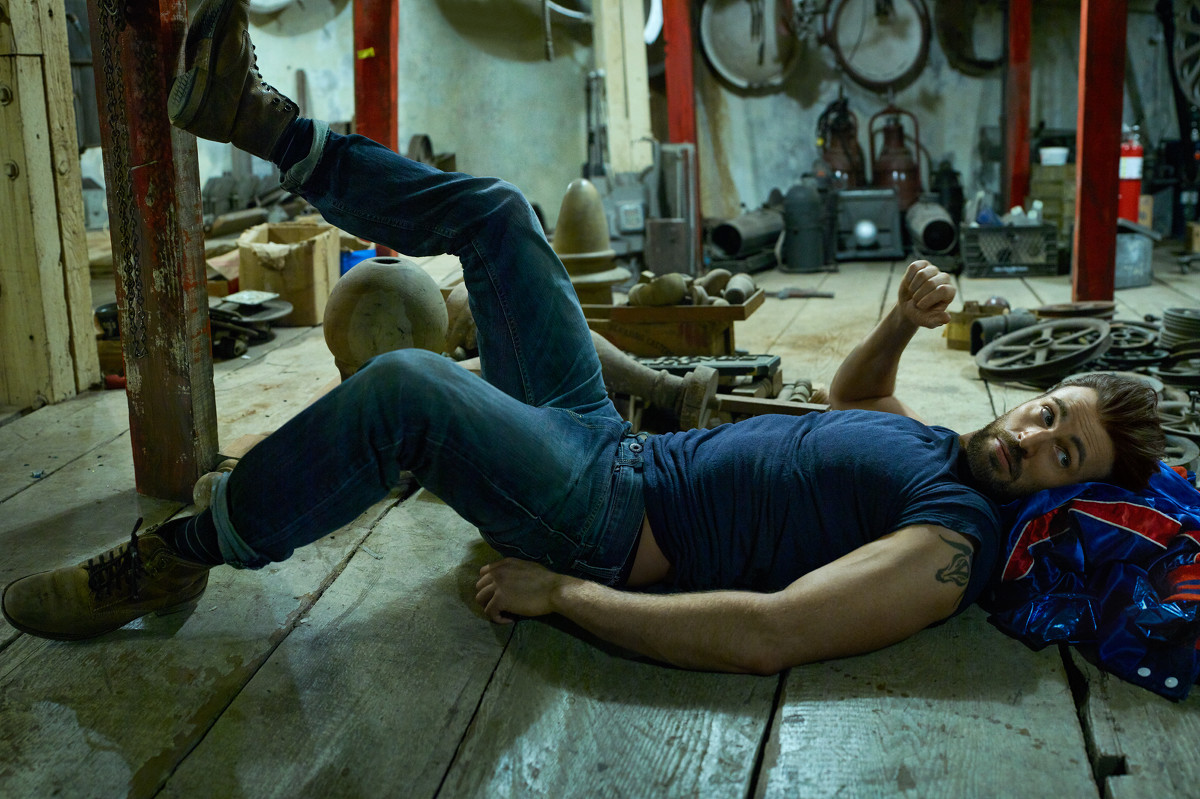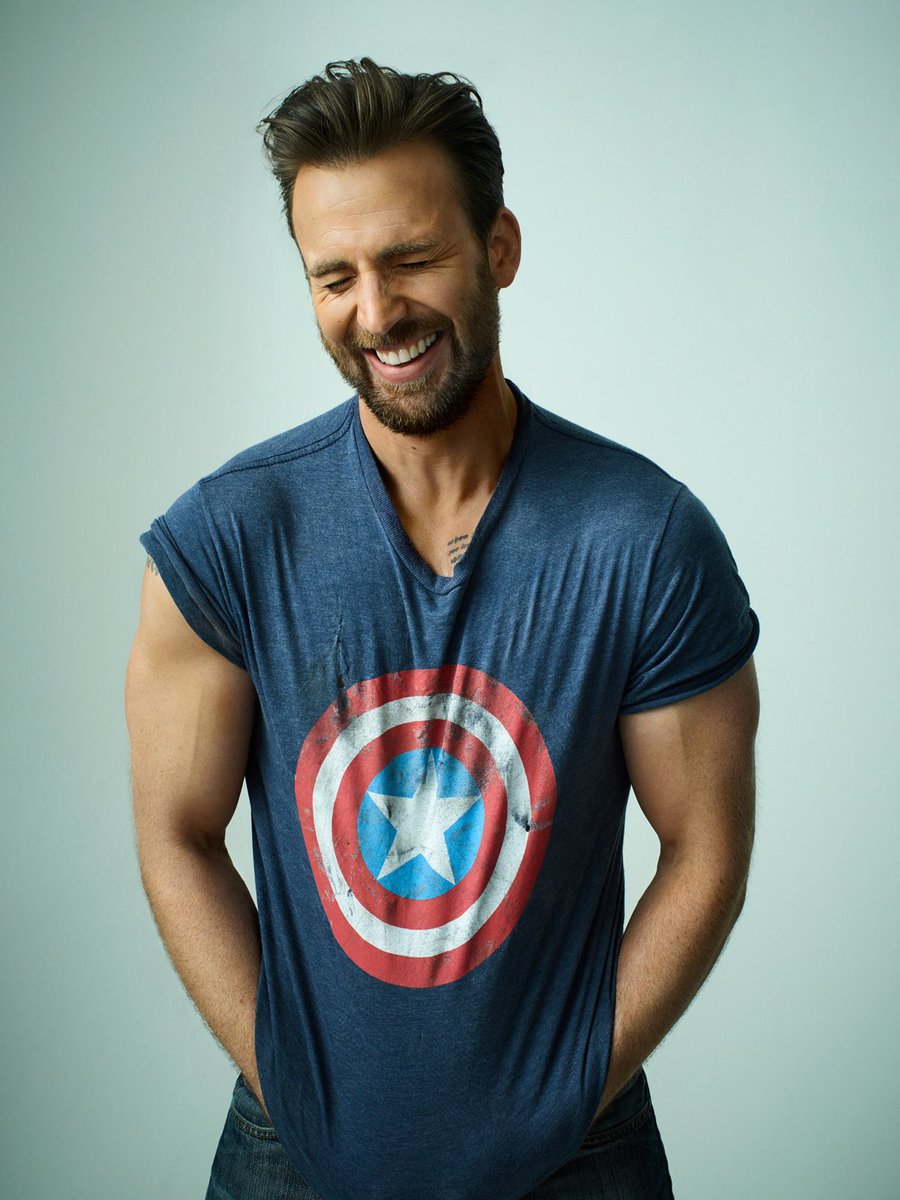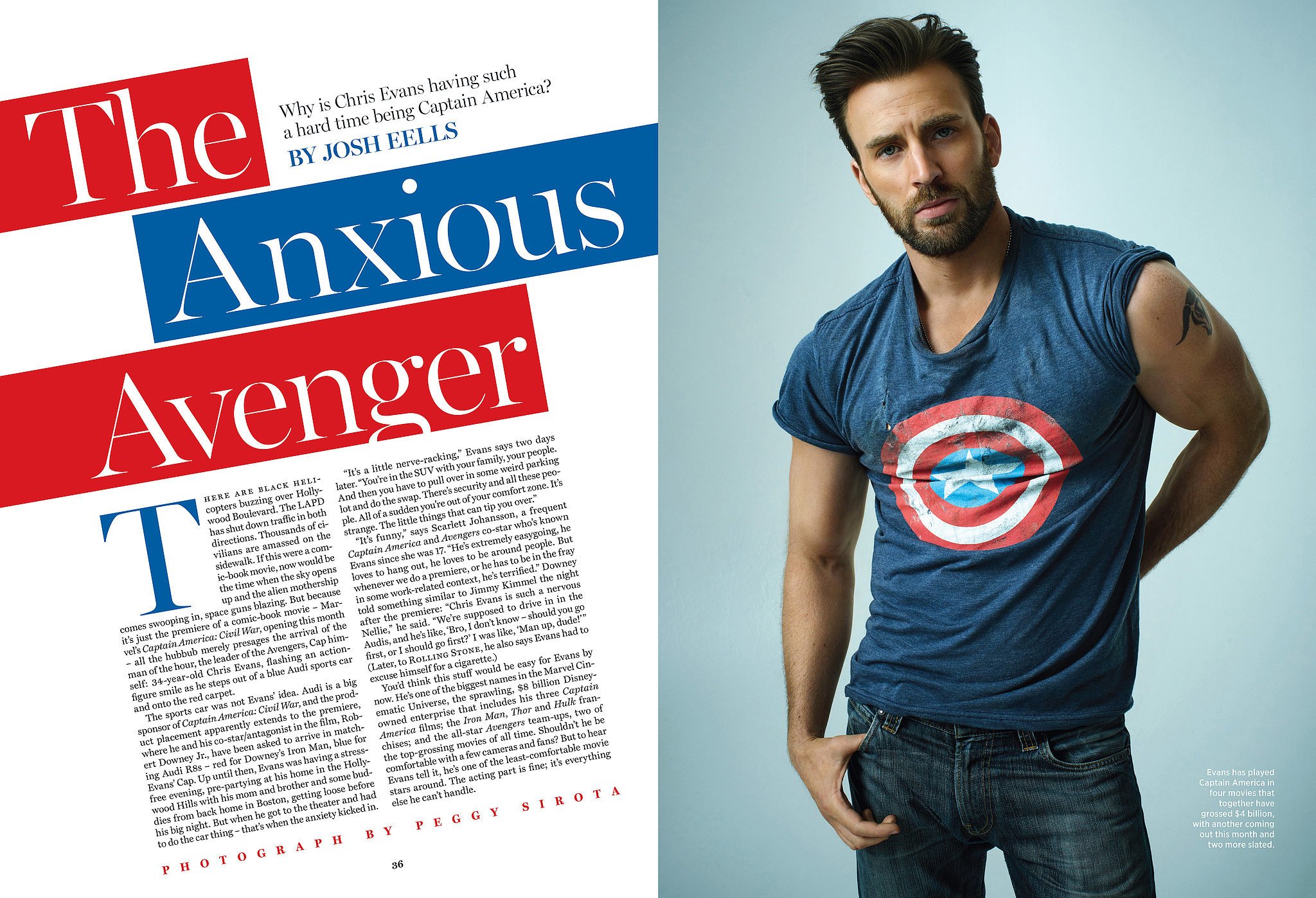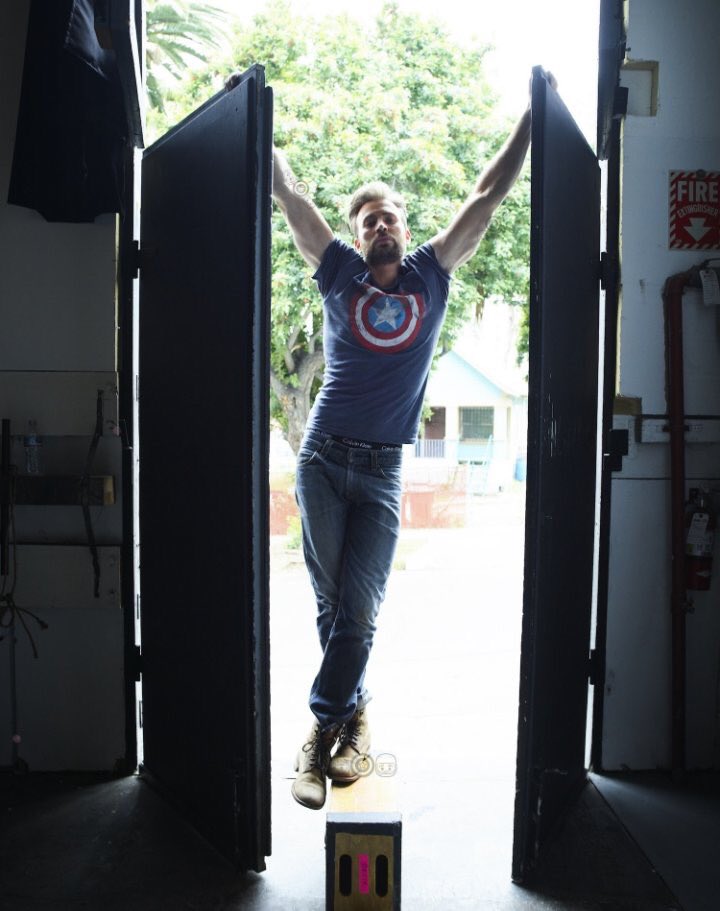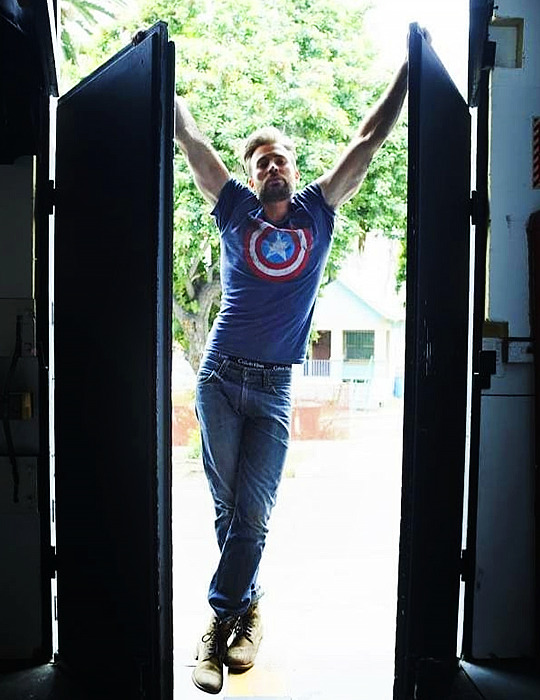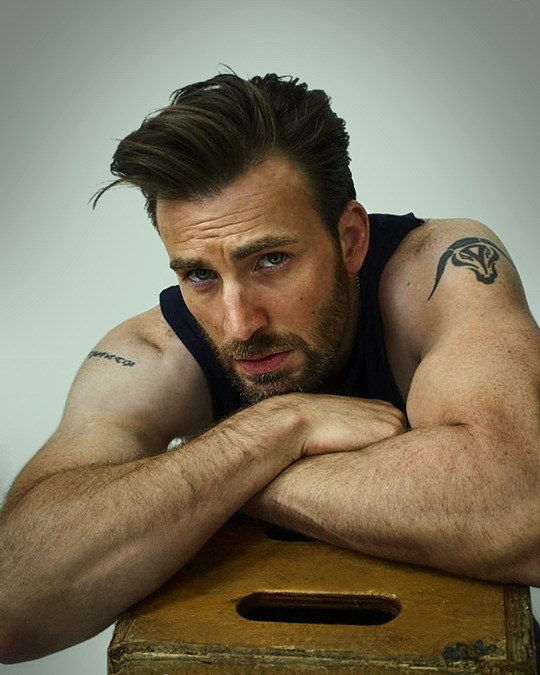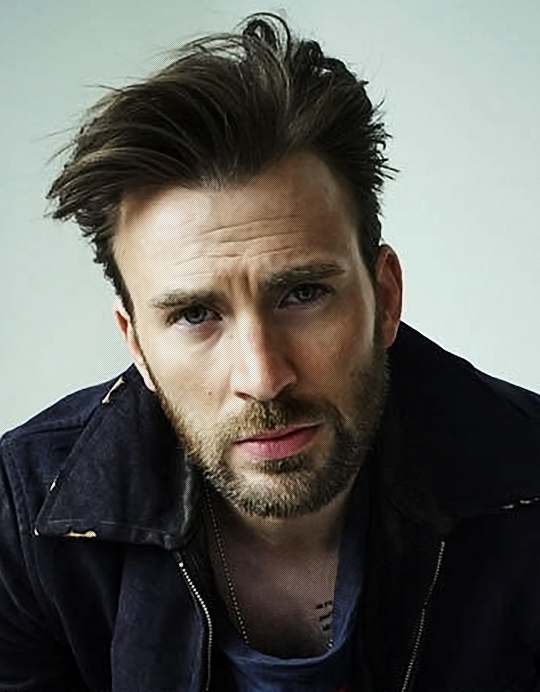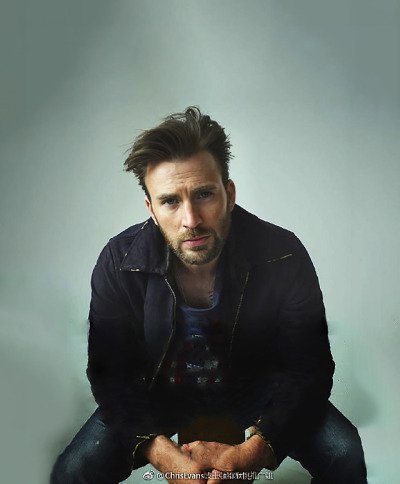Post by Picap on Feb 3, 2017 23:29:47 GMT
www.rollingstone.com/movies/features/captain-america-civil-war-why-chris-evans-is-the-anxious-avenger-20160504


Superhero-movie star on the pressures of being a Marvel MVP: “I love acting — but that’s not all you’re asking me to do”
There are black helicopters buzzing over Hollywood Boulevard. The LAPD has shut down traffic in both directions. Thousands of civilians are amassed on the sidewalk. If this were a comic- book movie, now would be the time when the sky opens up and the alien mothership comes swooping in, space guns blazing. But because it’s just the premiere of a comic-book movie – Marvel’s Captain America: Civil War, opening this month – all the hubbub merely presages the arrival of the man of the hour, the leader of the Avengers, Cap himself: 34-year-old Chris Evans, flashing an action figure smile as he steps out of a blue Audi sports car and onto the red carpet.
The sports car was not Evans’ idea. Audi is a big sponsor of Captain America: Civil War, and the product placement apparently extends to the premiere, where he and his co-star/antagonist in the film, Robert Downey Jr., have been asked to arrive in matching Audi R8s – red for Downey’s Iron Man, blue for Evans’ Cap. Up until then, Evans was having a stress-free evening, pre-partying at his home in the Hollywood Hills with his mom and brother and some buddies from back home in Boston, getting loose before his big night. But when he got to the theater and had to do the car thing – that’s when the anxiety kicked in.
“It’s a little nerve-racking,” Evans says two days later. “You’re in the SUV with your family, your people. And then you have to pull over in some weird parking lot and do the swap. There’s security and all these people. All of a sudden you’re out of your comfort zone. It’s strange. The little things that can tip you over.”
“It’s funny,” says Scarlett Johansson, a frequent Captain America and Avengers co-star who’s known Evans since she was 17. “He’s extremely easygoing, he loves to hang out, he loves to be around people. But whenever we do a premiere, or he has to be in the fray in some work-related context, he’s terrified.” Downey told something similar to Jimmy Kimmel the night after the premiere: “Chris Evans is such a nervous Nellie,” he said. “We’re supposed to drive in in the Audis, and he’s like, ‘Bro, I don’t know – should you go first, or I should go first?’ I was like, ‘Man up, dude!'” (Later, to Rolling Stone, he also says Evans had to excuse himself for a cigarette.)
You’d think this stuff would be easy for Evans by now. He’s one of the biggest names in the Marvel Cinematic Universe, the sprawling, $8 billion Disney-owned enterprise that includes his three Captain America films; the Iron Man, Thor and Hulk franchises; and the all-star Avengers team-ups, two of the top-grossing movies of all time. Shouldn’t he be comfortable with a few cameras and fans? But to hear Evans tell it, he’s one of the least-comfortable movie stars around. The acting part is fine; it’s everything else he can’t handle.
“A red carpet lasts, what, 30 minutes tops? But that to me is like 30 minutes of walking on hot coals,” Evans says, sitting at home in jeans, a Toronto Maple Leafs hat and a chambray shirt with a rip in one arm. “It’s not like a junket – junkets you sit in a room and they bring ’em in. I can do that all day and not have a meltdown. But the premiere – that’s overwhelming. It’s the volume of it: You’re in the center of this thing. You can fight a whole army if they line up one at a time. But if they surround you, you’re fucked.”

Evans’ mom, Lisa, is sitting in the next room (she stuck around after the premiere), and his one-year-old puppy, Dodger, a rambunctious golden-retriever mix, is on his lap. The house – a midcentury number he bought after the first Avengers – is perched near a stunning cliff-side overlook with IMAX views of the San Fernando Valley, including, if you know where to squint, the headquarters of Marvel Studios: the conglomerate that’s both the source of most of the great things in Evans’ life as well as the cause of much of his agony.
When Marvel first offered him the role of Captain America, Evans turned it down repeatedly. Partly it was the proposed nine-movie contract. (“It’s nuts,” he says. “If you make a big movie like Independence Day, they’ll lock you up for three movies. But nine is insane. We got it down to six.”) But he was also afraid of all the other commitments – the promo tours, the corporate tie-ins, the cameos, the auxiliary stuff. “This is the most outside asks you can incorporate into a movie,” Evans says. “I love acting – but that’s not all you’re asking me to do.”
He was also afraid of losing his anonymity: “In case you haven’t figured this out, he’s super-private,” his mom says. And interviews were the worst of all. “I’ve been dreading press since January,” Evans says. “It’s nice to talk about the work with people who are interested – but I freak out when I hear stupid questions about stupid things, and you’ve gotta act like you give a fuck. It’s part of the job, I’ve got to sell this thing. But it’s just a gross feeling. It makes me insecure.”
“It’s not like a junket – you sit in a room and they bring ’em in. I can do that all day and not have a meltdown. But the premiere – that’s overwhelming. You can fight a whole army if they line up one at a time. But if they surround you, you’re fucked.”
You don’t really expect this from a guy like Evans. He seems like an amiable bro, a thoughtful-yet-beefcake-y leading man who worships Tom Brady and the Patriots, and once served as the model for a surfer named Tyler in the board game Mystery Date. (“Favorite class: Study hall.” “Ideal date: Walk around the cliffs.”) But the truth is, behind the shredded biceps and the star-spangled suit, Evans is just as awkward, sensitive and neurotic as all the rest of us.
“Chris can be a delicate flower a little bit,” Johansson says. “You just want to pat his back: ‘Aw, Chrissy. You’re all right.’ It’s not like Robert [Downey Jr.], who I think puts on a persona to protect his private self. It’s not in Chris’ nature to put on a face that isn’t totally natural.”
His other problem, Evans says, is that he suffers from what he calls “a noisy brain.” It makes him second-guess everything, turns casual conversations into whirl- pools of self-doubt. “It’s a real nice spiral,” he says, grimacing. He’s tried calming his mind through meditation and Buddhism – he once spent three weeks studying with a guru in Rishikesh, India, and he says reading Siddhartha changed his life – and by reading the works of Oprah-approved spiritualist Eckhart Tolle. “I’ve gotten better,” Evans says. But he still struggles sometimes with overanalyzing things, with letting his self-consciousness take over, with not just being present in the moment.
“We used to call Chris ‘the thinker,'” his mom says. “When we’d go on long car rides, I’d say, ‘Bring your Gameboy,’ and he’d say, ‘No, Mom, I’m just going to look out the window and think.’ Sometimes I say, ‘Get out of there, honey. Get out of your head. Come out here with the rest of us. It’s really nice out here.’ But this is who he’s been since he was a little boy.”

It can be hard for Evans in Hollywood. “I don’t like having silly surface discussions,” he says. “A lot of times that’s required in this business. That’s when the social anxiety kicks in. When you feel kind of un-invested, like you’re playing some sort of game you know you shouldn’t be playing. You’re making just more noise, and more trash, and almost selling something, and nothing of this is clean. It’s all a river of garbage, and you’re just in it.”
But when he’s acting, on the other hand, “that part of your brain just gets quiet,” Evans says. “The noise goes away. You’re just leaned into the experience. You’re really riding the wave of just living.”
And then, in classic Evans style, he plays that last part back in his head. “That’s an incredibly douche-y thing to say,” he says, cringing. “Please don’t put that in there. Ugh! ‘Riding the wave of just living’?” He laughs. “No! Fuck!”
Evans has a shield in his house. Marvel sent it to him; sometimes it comes out at parties once everyone’s had a few drinks. It’s a pretty good selfie prop. “You want to see it?” he says. We walk over to a junk-filled hall closet and he opens the door. Propped on the floor, there’s an exact replica of Captain America’s red-white-and-blue shield. It’s heavier than it looks. “Yeah, it’s dangerous,” Evans says, hefting it. Then he lays it back on the ground and closes the door.
According to Downey, out of all the Marvel franchises, Captain America was, weirdly, the riskiest. It’s easy to forget $1 billion in box-office receipts later, but the character, with his old-fashioned morality and World War II-era squareness, had the potential to be a real cornball. Cap doesn’t drink or swear; until recently, Evans thought he’d never even had sex. (“At this point, he probably has,” Evans says. “He has to have. But he’s respectful – he never talks about it.”) Evans has done a great job taking a character who could have been, as he puts it, “a real piece of cardboard” and injecting him with humanity, wit and charm.
“There’s a sort of a loneliness about the way that Chris plays [Cap] that I think is very touching,” Johansson says. “He has a kind of longing, self-searching quality that Chris has given him – like he’s struggling with something maybe all of us are struggling with.” Downey, who helped persuade Evans to sign up for the role, agrees. “Somehow or another,” he says, “he made Captain America cool.”
“He’s a little vanilla,” admits Evans of Cap. “He’s a good man, but he’s not exactly flashy. He doesn’t have the great one-liners; he’s not flying around shooting missiles. He’s probably not the one your kids want to dress up as. So it’s tricky.”
As a kid growing up in Sudbury, a “cliché suburban town” about 30 minutes outside Boston, Evans never dressed up as any comic-book character. He loved drawing and animation, especially Disney films (Beauty and the Beast made him want to be an artist, and he can still sing all of The Little Mermaid), but surprisingly, he had no interest in comics (“Not even one,” his mom says). Lisa was a stay-at-home mom, and his dad is a dentist. There’s a line in Civil War when Tony Stark says to Cap, “Sometimes I want to punch you in your perfect teeth.” “My dad loves that line,” says Evans, grinning.
Evans has compared his family to New England Von Trapps: He has three siblings, all of whom grew up performing. “There’s no greater joy than being at a premiere with Evans’ family,” says Downey. “It’s like the classy, cultured version of The Fighter.” At 10, Chris started acting at a local youth theater, doing plays like The Velveteen Rabbit and Charlie and the Chocolate Factory. (“I actually got hosed in that one,” he recalls, laughing. “I should have been Willie Wonka. I got Grandpa Joe.”)
In high school, the six-foot Evans played lacrosse and wrestled, but really he was a drama dork in a lax bro’s body. He starred in productions like Bye Bye Birdie, and his senior year, he was voted “most theatrical.” (“He wanted to be ‘best-dressed,'” says Lisa.) To this day, “You can start singing any line from Oklahoma! and he’ll just break out in song,” Johansson says. After a summer internship at a casting agency in New York, he got an agent of his own, and soon landed a pilot and moved to L.A., where he found work as the handsome leading dude in high school films like Not Another Teen Movie and The Perfect Score.
“He was trying to figure out where he fit,” recalls Johansson, who co-starred with Evans in the latter film, and again a few years later in The Nanny Diaries, in which he played a character known as “Harvard Hottie.” “He was kind of pigeonholed as this all-American hunky guy, and it didn’t seem to be satisfying his creative urge. At the time, I think he was actually considering going solely into directing, because I think he felt that he had more to offer than what he was being given. It’s ridiculous to say that he’s plagued by these devastatingly good looks … but with Chris, it’s almost like the studios need to mature, more than the other way around.”
In 2004, Evans was cast in a Marvel superhero movie that would change his life: the first version of The Fantastic Four. “It was exciting,” he says of his role as Johnny Storm, a.k.a. the Human Torch. “It was the best I’d been paid so far. You knew it had a franchise hope. So I was thrilled. But at the same time a little uneasy – because the movies weren’t exactly the way I’d envisioned them.” (Evans’ polite way of saying “not good.”) “It started to wear on me,” he says. “I want to make movies I’m proud of. And when that doesn’t happen, it can get really challenging.”

The whole experience may be what made him gun-shy a few years later when Marvel came calling again, this time about Captain America. “I was thrilled to have been chosen,” Evans says, “because there was no way I was going to do it. I looked at it as the thing that would get me to the next thing. Then all of a sudden you’re doing it, and you’re like, ‘Oh, fuck. What did I do?'”
The new movie, Civil War, focuses on an existential question that crops up frequently in comics: Are the Avengers superheroes or vigilantes, and who should be held responsible for the civilian casualties left in their wake? That debate pits Cap, a.k.a. Steve Rogers, and his supporters against Iron Man, a.k.a. Tony Stark, and his – a conflict that’s been brewing since the first Avengers movie, when Cap told a wise- cracking Stark to “put on the suit, let’s go a few rounds.” (“I have to tell you,” Evans’ mom says. “Before he made Avengers, Chris was absolutely terrified of Downey. He said, ‘Mom, I’m so nervous. I don’t want to screw up.'”) Interestingly, it’s Captain America – by-the-book member of the Greatest Generation and literal tool of government propaganda – who comes down on the side of defying U.N. authority, while Stark, erstwhile arms dealer and roguish billionaire, favors submitting to their control.
“It’s a nice role reversal,” says Evans. “You have a company man like Steve who always believed in the hierarchy of the military, but in the last couple of movies has seen the people he was loyal to misuse their power. Whereas Tony, who’s always danced to the beat of his own drum, is feeling guilt for the collateral damage they’ve left. But that’s why I like this movie: There’s no clear villain in terms of right and wrong. And the truth is, I actually think Tony is right. To see Steve prioritize himself over what other people need is selfish. That’s what makes it interesting.”
“L.A. is where I come to work, where I have meetings and, unfortunately, where I feel moments of anxiety. Sometimes L.A. is great. And sometimes you just drive down Sunset like, ‘Ugh. Fuckin’ Hollywood.'”
Now that he’s done five movies as Cap, Evans would love to play someone with more of a dark side, like he did in 2013’s excellent Snowpiercer. “Since 2010, I’ve never gone more than a year without putting that fuckin’ thing on,” he says of Cap’s suit. He still enjoys the experience, but he’s excited to figure out what comes next: “I’d love to find something where I get to be, like, a flashy defense lawyer. Someone with the gift of gab.” He also wants to try his hand at directing again, after learning a lot on his first feature, 2014’s Before We Go – a Linklater-ish love story he made with a budget of $3 million, roughly what Downey gets paid for commuting to set. Evans even thinks about going to New York and getting back into theater someday. “There’s no press junkets for a play,” he says enviously. “You do your work and you get to go home.”
Evans has been in Los Angeles 17 years now – half his life – and it’s wearing on him a little. “I don’t knock L.A.,” he says. “But L.A. is where I come to work, where I have meetings and, unfortunately, where I feel moments of anxiety. Sometimes L.A. is great. And sometimes you just drive down Sunset like, ‘Ugh. Fuckin’ Hollywood.'”
We’ve been talking for a while when Evans’ buzzer rings. “It’s D!” his mom calls from the other room.
“One of my buddies from Boston,” says Evans. “With my mom in town, some of the guys I grew up with who live here now are coming through to say hello to Ma Dukes.”
A moment later, Evans’ old friend Demery walks in, carrying his 11-month-old son, Noah. “What up, man?” Evans says.
“‘Sup, brother?” says Demery, high- fiving him. “You good?”
Demery retires to the patio with Noah and Evans’ mom to chat. “It’s nuts,” says Evans. “D has a kid, man. He’s his whole world. I really want them. My sister has kids – they’re seven, five and three – and going home and being around them feels great. I’m really trying to have kids soon. Certain things have to fall in place.”
Like what? Evans laughs. “Gotta find a wife.” He’s been linked to actresses including Minka Kelly, Lily Collins and a pre-Timberlake Jessica Biel, but right now, he says he’s single. (His date at this year’s Oscars was his sister Carly.)
Evans calls Civil War, definitively, “the last installment of Captain America.” In November, he heads to Atlanta for back-to-back filming on the third and fourth Avengers. “Like, 10 months,” he says of the shoot. “Ugh. My body’s gonna fall apart.” Downey says Marvel movies are like the presidency, in that they age you prematurely: “I hope he’s enjoying this moment, where he’s still tall and blue-eyed and handsome.”
Avengers 4 is the last Marvel film that Evans is committed to. His original contract had him through three only, but like Downey – whose contract ended after Iron Man 3 and who’s been negotiating huge re-ups for every one since – Evans extended for one more. Better believe he got paid for it, too. “Oh, yeah,” he says, laughing. “They didn’t punch their Chris Evans card – like, ‘You get the seventh one free!’ Yeah, no.”
Evans is supposed to leave the house at five to catch a private jet to Phoenix, where he and co-star Sebastian Stan are going to surprise the audience at a Civil War sneak preview. A few minutes later, his friend and assistant Josh comes in carrying a green juice (Evans: “Is that for me? Sweet!”) and reminds him that it’s 4:40.
“It’s 4:40?” Evans says, leaping up from the couch. “Oh, shit! I gotta go!” All of a sudden, the panic sets in. “I have to shower,” he says, looking frantic. “They can’t leave without me, right?”
But then he takes a breath. “Wait, wait.” The car may be coming at five, but he doesn’t have to be there until six. And they’re flying from Burbank, just 25 minutes away. He’s got plenty of time. “It’s OK,” he says, exhaling. “Everything is OK.”[/quote]


‘Captain America: Civil War’: Why Chris Evans Is the Anxious Avenger
Superhero-movie star on the pressures of being a Marvel MVP: “I love acting — but that’s not all you’re asking me to do”
There are black helicopters buzzing over Hollywood Boulevard. The LAPD has shut down traffic in both directions. Thousands of civilians are amassed on the sidewalk. If this were a comic- book movie, now would be the time when the sky opens up and the alien mothership comes swooping in, space guns blazing. But because it’s just the premiere of a comic-book movie – Marvel’s Captain America: Civil War, opening this month – all the hubbub merely presages the arrival of the man of the hour, the leader of the Avengers, Cap himself: 34-year-old Chris Evans, flashing an action figure smile as he steps out of a blue Audi sports car and onto the red carpet.
The sports car was not Evans’ idea. Audi is a big sponsor of Captain America: Civil War, and the product placement apparently extends to the premiere, where he and his co-star/antagonist in the film, Robert Downey Jr., have been asked to arrive in matching Audi R8s – red for Downey’s Iron Man, blue for Evans’ Cap. Up until then, Evans was having a stress-free evening, pre-partying at his home in the Hollywood Hills with his mom and brother and some buddies from back home in Boston, getting loose before his big night. But when he got to the theater and had to do the car thing – that’s when the anxiety kicked in.
“It’s a little nerve-racking,” Evans says two days later. “You’re in the SUV with your family, your people. And then you have to pull over in some weird parking lot and do the swap. There’s security and all these people. All of a sudden you’re out of your comfort zone. It’s strange. The little things that can tip you over.”
“It’s funny,” says Scarlett Johansson, a frequent Captain America and Avengers co-star who’s known Evans since she was 17. “He’s extremely easygoing, he loves to hang out, he loves to be around people. But whenever we do a premiere, or he has to be in the fray in some work-related context, he’s terrified.” Downey told something similar to Jimmy Kimmel the night after the premiere: “Chris Evans is such a nervous Nellie,” he said. “We’re supposed to drive in in the Audis, and he’s like, ‘Bro, I don’t know – should you go first, or I should go first?’ I was like, ‘Man up, dude!'” (Later, to Rolling Stone, he also says Evans had to excuse himself for a cigarette.)
You’d think this stuff would be easy for Evans by now. He’s one of the biggest names in the Marvel Cinematic Universe, the sprawling, $8 billion Disney-owned enterprise that includes his three Captain America films; the Iron Man, Thor and Hulk franchises; and the all-star Avengers team-ups, two of the top-grossing movies of all time. Shouldn’t he be comfortable with a few cameras and fans? But to hear Evans tell it, he’s one of the least-comfortable movie stars around. The acting part is fine; it’s everything else he can’t handle.
“A red carpet lasts, what, 30 minutes tops? But that to me is like 30 minutes of walking on hot coals,” Evans says, sitting at home in jeans, a Toronto Maple Leafs hat and a chambray shirt with a rip in one arm. “It’s not like a junket – junkets you sit in a room and they bring ’em in. I can do that all day and not have a meltdown. But the premiere – that’s overwhelming. It’s the volume of it: You’re in the center of this thing. You can fight a whole army if they line up one at a time. But if they surround you, you’re fucked.”

Evans’ mom, Lisa, is sitting in the next room (she stuck around after the premiere), and his one-year-old puppy, Dodger, a rambunctious golden-retriever mix, is on his lap. The house – a midcentury number he bought after the first Avengers – is perched near a stunning cliff-side overlook with IMAX views of the San Fernando Valley, including, if you know where to squint, the headquarters of Marvel Studios: the conglomerate that’s both the source of most of the great things in Evans’ life as well as the cause of much of his agony.
When Marvel first offered him the role of Captain America, Evans turned it down repeatedly. Partly it was the proposed nine-movie contract. (“It’s nuts,” he says. “If you make a big movie like Independence Day, they’ll lock you up for three movies. But nine is insane. We got it down to six.”) But he was also afraid of all the other commitments – the promo tours, the corporate tie-ins, the cameos, the auxiliary stuff. “This is the most outside asks you can incorporate into a movie,” Evans says. “I love acting – but that’s not all you’re asking me to do.”
He was also afraid of losing his anonymity: “In case you haven’t figured this out, he’s super-private,” his mom says. And interviews were the worst of all. “I’ve been dreading press since January,” Evans says. “It’s nice to talk about the work with people who are interested – but I freak out when I hear stupid questions about stupid things, and you’ve gotta act like you give a fuck. It’s part of the job, I’ve got to sell this thing. But it’s just a gross feeling. It makes me insecure.”
“It’s not like a junket – you sit in a room and they bring ’em in. I can do that all day and not have a meltdown. But the premiere – that’s overwhelming. You can fight a whole army if they line up one at a time. But if they surround you, you’re fucked.”
You don’t really expect this from a guy like Evans. He seems like an amiable bro, a thoughtful-yet-beefcake-y leading man who worships Tom Brady and the Patriots, and once served as the model for a surfer named Tyler in the board game Mystery Date. (“Favorite class: Study hall.” “Ideal date: Walk around the cliffs.”) But the truth is, behind the shredded biceps and the star-spangled suit, Evans is just as awkward, sensitive and neurotic as all the rest of us.
“Chris can be a delicate flower a little bit,” Johansson says. “You just want to pat his back: ‘Aw, Chrissy. You’re all right.’ It’s not like Robert [Downey Jr.], who I think puts on a persona to protect his private self. It’s not in Chris’ nature to put on a face that isn’t totally natural.”
His other problem, Evans says, is that he suffers from what he calls “a noisy brain.” It makes him second-guess everything, turns casual conversations into whirl- pools of self-doubt. “It’s a real nice spiral,” he says, grimacing. He’s tried calming his mind through meditation and Buddhism – he once spent three weeks studying with a guru in Rishikesh, India, and he says reading Siddhartha changed his life – and by reading the works of Oprah-approved spiritualist Eckhart Tolle. “I’ve gotten better,” Evans says. But he still struggles sometimes with overanalyzing things, with letting his self-consciousness take over, with not just being present in the moment.
“We used to call Chris ‘the thinker,'” his mom says. “When we’d go on long car rides, I’d say, ‘Bring your Gameboy,’ and he’d say, ‘No, Mom, I’m just going to look out the window and think.’ Sometimes I say, ‘Get out of there, honey. Get out of your head. Come out here with the rest of us. It’s really nice out here.’ But this is who he’s been since he was a little boy.”

It can be hard for Evans in Hollywood. “I don’t like having silly surface discussions,” he says. “A lot of times that’s required in this business. That’s when the social anxiety kicks in. When you feel kind of un-invested, like you’re playing some sort of game you know you shouldn’t be playing. You’re making just more noise, and more trash, and almost selling something, and nothing of this is clean. It’s all a river of garbage, and you’re just in it.”
But when he’s acting, on the other hand, “that part of your brain just gets quiet,” Evans says. “The noise goes away. You’re just leaned into the experience. You’re really riding the wave of just living.”
And then, in classic Evans style, he plays that last part back in his head. “That’s an incredibly douche-y thing to say,” he says, cringing. “Please don’t put that in there. Ugh! ‘Riding the wave of just living’?” He laughs. “No! Fuck!”
Evans has a shield in his house. Marvel sent it to him; sometimes it comes out at parties once everyone’s had a few drinks. It’s a pretty good selfie prop. “You want to see it?” he says. We walk over to a junk-filled hall closet and he opens the door. Propped on the floor, there’s an exact replica of Captain America’s red-white-and-blue shield. It’s heavier than it looks. “Yeah, it’s dangerous,” Evans says, hefting it. Then he lays it back on the ground and closes the door.
According to Downey, out of all the Marvel franchises, Captain America was, weirdly, the riskiest. It’s easy to forget $1 billion in box-office receipts later, but the character, with his old-fashioned morality and World War II-era squareness, had the potential to be a real cornball. Cap doesn’t drink or swear; until recently, Evans thought he’d never even had sex. (“At this point, he probably has,” Evans says. “He has to have. But he’s respectful – he never talks about it.”) Evans has done a great job taking a character who could have been, as he puts it, “a real piece of cardboard” and injecting him with humanity, wit and charm.
“There’s a sort of a loneliness about the way that Chris plays [Cap] that I think is very touching,” Johansson says. “He has a kind of longing, self-searching quality that Chris has given him – like he’s struggling with something maybe all of us are struggling with.” Downey, who helped persuade Evans to sign up for the role, agrees. “Somehow or another,” he says, “he made Captain America cool.”
“He’s a little vanilla,” admits Evans of Cap. “He’s a good man, but he’s not exactly flashy. He doesn’t have the great one-liners; he’s not flying around shooting missiles. He’s probably not the one your kids want to dress up as. So it’s tricky.”
As a kid growing up in Sudbury, a “cliché suburban town” about 30 minutes outside Boston, Evans never dressed up as any comic-book character. He loved drawing and animation, especially Disney films (Beauty and the Beast made him want to be an artist, and he can still sing all of The Little Mermaid), but surprisingly, he had no interest in comics (“Not even one,” his mom says). Lisa was a stay-at-home mom, and his dad is a dentist. There’s a line in Civil War when Tony Stark says to Cap, “Sometimes I want to punch you in your perfect teeth.” “My dad loves that line,” says Evans, grinning.
Evans has compared his family to New England Von Trapps: He has three siblings, all of whom grew up performing. “There’s no greater joy than being at a premiere with Evans’ family,” says Downey. “It’s like the classy, cultured version of The Fighter.” At 10, Chris started acting at a local youth theater, doing plays like The Velveteen Rabbit and Charlie and the Chocolate Factory. (“I actually got hosed in that one,” he recalls, laughing. “I should have been Willie Wonka. I got Grandpa Joe.”)
In high school, the six-foot Evans played lacrosse and wrestled, but really he was a drama dork in a lax bro’s body. He starred in productions like Bye Bye Birdie, and his senior year, he was voted “most theatrical.” (“He wanted to be ‘best-dressed,'” says Lisa.) To this day, “You can start singing any line from Oklahoma! and he’ll just break out in song,” Johansson says. After a summer internship at a casting agency in New York, he got an agent of his own, and soon landed a pilot and moved to L.A., where he found work as the handsome leading dude in high school films like Not Another Teen Movie and The Perfect Score.
“He was trying to figure out where he fit,” recalls Johansson, who co-starred with Evans in the latter film, and again a few years later in The Nanny Diaries, in which he played a character known as “Harvard Hottie.” “He was kind of pigeonholed as this all-American hunky guy, and it didn’t seem to be satisfying his creative urge. At the time, I think he was actually considering going solely into directing, because I think he felt that he had more to offer than what he was being given. It’s ridiculous to say that he’s plagued by these devastatingly good looks … but with Chris, it’s almost like the studios need to mature, more than the other way around.”
In 2004, Evans was cast in a Marvel superhero movie that would change his life: the first version of The Fantastic Four. “It was exciting,” he says of his role as Johnny Storm, a.k.a. the Human Torch. “It was the best I’d been paid so far. You knew it had a franchise hope. So I was thrilled. But at the same time a little uneasy – because the movies weren’t exactly the way I’d envisioned them.” (Evans’ polite way of saying “not good.”) “It started to wear on me,” he says. “I want to make movies I’m proud of. And when that doesn’t happen, it can get really challenging.”

The whole experience may be what made him gun-shy a few years later when Marvel came calling again, this time about Captain America. “I was thrilled to have been chosen,” Evans says, “because there was no way I was going to do it. I looked at it as the thing that would get me to the next thing. Then all of a sudden you’re doing it, and you’re like, ‘Oh, fuck. What did I do?'”
The new movie, Civil War, focuses on an existential question that crops up frequently in comics: Are the Avengers superheroes or vigilantes, and who should be held responsible for the civilian casualties left in their wake? That debate pits Cap, a.k.a. Steve Rogers, and his supporters against Iron Man, a.k.a. Tony Stark, and his – a conflict that’s been brewing since the first Avengers movie, when Cap told a wise- cracking Stark to “put on the suit, let’s go a few rounds.” (“I have to tell you,” Evans’ mom says. “Before he made Avengers, Chris was absolutely terrified of Downey. He said, ‘Mom, I’m so nervous. I don’t want to screw up.'”) Interestingly, it’s Captain America – by-the-book member of the Greatest Generation and literal tool of government propaganda – who comes down on the side of defying U.N. authority, while Stark, erstwhile arms dealer and roguish billionaire, favors submitting to their control.
“It’s a nice role reversal,” says Evans. “You have a company man like Steve who always believed in the hierarchy of the military, but in the last couple of movies has seen the people he was loyal to misuse their power. Whereas Tony, who’s always danced to the beat of his own drum, is feeling guilt for the collateral damage they’ve left. But that’s why I like this movie: There’s no clear villain in terms of right and wrong. And the truth is, I actually think Tony is right. To see Steve prioritize himself over what other people need is selfish. That’s what makes it interesting.”
“L.A. is where I come to work, where I have meetings and, unfortunately, where I feel moments of anxiety. Sometimes L.A. is great. And sometimes you just drive down Sunset like, ‘Ugh. Fuckin’ Hollywood.'”
Now that he’s done five movies as Cap, Evans would love to play someone with more of a dark side, like he did in 2013’s excellent Snowpiercer. “Since 2010, I’ve never gone more than a year without putting that fuckin’ thing on,” he says of Cap’s suit. He still enjoys the experience, but he’s excited to figure out what comes next: “I’d love to find something where I get to be, like, a flashy defense lawyer. Someone with the gift of gab.” He also wants to try his hand at directing again, after learning a lot on his first feature, 2014’s Before We Go – a Linklater-ish love story he made with a budget of $3 million, roughly what Downey gets paid for commuting to set. Evans even thinks about going to New York and getting back into theater someday. “There’s no press junkets for a play,” he says enviously. “You do your work and you get to go home.”
Evans has been in Los Angeles 17 years now – half his life – and it’s wearing on him a little. “I don’t knock L.A.,” he says. “But L.A. is where I come to work, where I have meetings and, unfortunately, where I feel moments of anxiety. Sometimes L.A. is great. And sometimes you just drive down Sunset like, ‘Ugh. Fuckin’ Hollywood.'”
We’ve been talking for a while when Evans’ buzzer rings. “It’s D!” his mom calls from the other room.
“One of my buddies from Boston,” says Evans. “With my mom in town, some of the guys I grew up with who live here now are coming through to say hello to Ma Dukes.”
A moment later, Evans’ old friend Demery walks in, carrying his 11-month-old son, Noah. “What up, man?” Evans says.
“‘Sup, brother?” says Demery, high- fiving him. “You good?”
Demery retires to the patio with Noah and Evans’ mom to chat. “It’s nuts,” says Evans. “D has a kid, man. He’s his whole world. I really want them. My sister has kids – they’re seven, five and three – and going home and being around them feels great. I’m really trying to have kids soon. Certain things have to fall in place.”
Like what? Evans laughs. “Gotta find a wife.” He’s been linked to actresses including Minka Kelly, Lily Collins and a pre-Timberlake Jessica Biel, but right now, he says he’s single. (His date at this year’s Oscars was his sister Carly.)
Evans calls Civil War, definitively, “the last installment of Captain America.” In November, he heads to Atlanta for back-to-back filming on the third and fourth Avengers. “Like, 10 months,” he says of the shoot. “Ugh. My body’s gonna fall apart.” Downey says Marvel movies are like the presidency, in that they age you prematurely: “I hope he’s enjoying this moment, where he’s still tall and blue-eyed and handsome.”
Avengers 4 is the last Marvel film that Evans is committed to. His original contract had him through three only, but like Downey – whose contract ended after Iron Man 3 and who’s been negotiating huge re-ups for every one since – Evans extended for one more. Better believe he got paid for it, too. “Oh, yeah,” he says, laughing. “They didn’t punch their Chris Evans card – like, ‘You get the seventh one free!’ Yeah, no.”
Evans is supposed to leave the house at five to catch a private jet to Phoenix, where he and co-star Sebastian Stan are going to surprise the audience at a Civil War sneak preview. A few minutes later, his friend and assistant Josh comes in carrying a green juice (Evans: “Is that for me? Sweet!”) and reminds him that it’s 4:40.
“It’s 4:40?” Evans says, leaping up from the couch. “Oh, shit! I gotta go!” All of a sudden, the panic sets in. “I have to shower,” he says, looking frantic. “They can’t leave without me, right?”
But then he takes a breath. “Wait, wait.” The car may be coming at five, but he doesn’t have to be there until six. And they’re flying from Burbank, just 25 minutes away. He’s got plenty of time. “It’s OK,” he says, exhaling. “Everything is OK.”[/quote]


